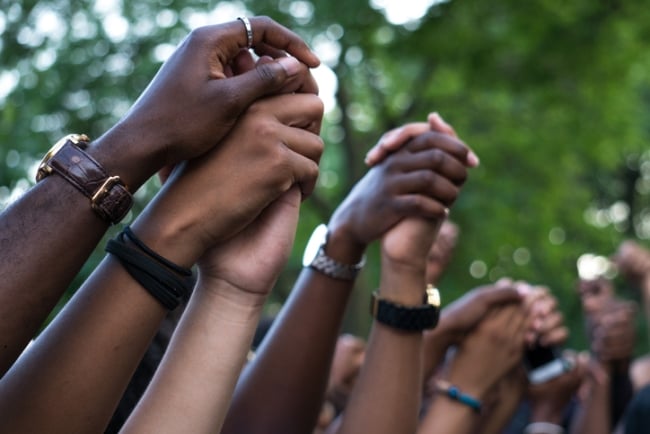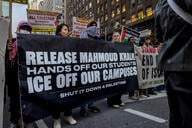You have /5 articles left.
Sign up for a free account or log in.

iStock.com/Josie Desmarais
Summar McGee, a new graduate of Rice University, felt “helpless” as large protests led largely by young people like her spread in cities across the country after the police killing of George Floyd.
Being back home in a small town in Mississippi after graduating just last month and watching the events unfold on television made her feel disconnected from the spontaneous social movement taking shape before her eyes, including in Houston, where the university is located and where Floyd's funeral was to be held today. The same energy and activism were not present in her own community, where she said the long history of racism discourages black people from speaking out against injustices.
McGee had been the president of the Black Student Association at Rice, and she felt the group’s own attempts to push for changes in the interest of black students, such as calling for more stringent hate speech policies and a reduced campus police presence, were largely ineffective. She personally experienced racism on campus and said although Rice administrators frequently spoke about its commitment to diversity and inclusion, the university's structure was not "built with diversity and inclusion in mind."
“The question is, are you really about it? Now is the time to act,” McGee said. "We’ve been having these conversations, working on this. If you’re doing the same thing over and over again, you’re just going to get the same result."
Students at colleges across the U.S. have been actively watching and critiquing the words spoken and steps taken by administrators at their colleges to address Floyd’s death and the larger issues of racism and white supremacy in this country. They have monitored the social media posts of their peers for offensive language and demanded their universities cut ties with local police departments. Others, such as McGee, are tired of waiting for changes they've pushed for to move through the university bureaucracy and are completely bypassing it.
McGee and other recent graduates and current students have instead asked university alumni, staff members and administrators to “put their money where their mouth is” and support Rice for Black Life, or R4BL, a coalition the students recently formed to serve as a bridge between the campus and community organizers leading demonstrations, and to provide financial support to black families and the antiracism movement.
The coalition raised $93,362 in donations in just 24 hours for Black Lives Matter Houston, the Texas Organizing Project, Indivisible Houston and Pure Justice. The fundraiser gave students an accessible and direct way to fund the activists leading protests in Houston through GoFundMe and leveraged Rice’s connections to wealthy alumni and donors, McGee said.
“Universities have these big fundraising relationships with alumni and affiliates,” said Bilal Rehman, a recent Rice graduate and R4BL organizer, who is Pakistani. “We could tap into those networks that are already primed and already accustomed to giving.”
R4BL created its own list of frequent university donors, high-profile academics, department heads and senior administrators to directly reach out to and ask for donations, said Maddy Scannell, a rising senior who is white and one of the coalition’s organizers. The university’s president, David Leebron, donated $200 and tweeted about the fundraiser, Scannell said.
As the protests grew, Rice students and staff members were expressing their desire to engage in activism against racial injustices, but they didn’t know how to proceed, Scannell said. McGee said R4BL gave students and Rice’s networks of wealthy donors, boosters and civic supporters a place to direct their support. The fundraiser’s success has inspired student organizers at more than 100 campuses across the country to contact R4BL for guidance on how to replicate the Rice students' model at their own colleges.
Cornell Students for Black Lives, or C4BL, is pooling the support and alumni networks of 185 student organizations on campus for a six-day fundraiser, which raised more than $29,000 by its halfway point on June 8. Donations will go to various community organizations near the private university in Ithaca, N.Y., including Black Lives Matter of Greater New York and Communities United for Police Reform. After the fundraiser is over, the coalition’s organizing committee will be discussing changes black students want to pursue at the institutional level, said Ashley Bishop, a rising junior and member of C4BL’s organizing committee, who is black.
Sherell Farmer, also a rising junior and a member of C4BL’s organizing committee, who is black, said she hopes the movement instills lasting changes to Cornell’s majority-white student organizations, many of which are participating in the coalition.
"There are spaces on campus where you’re never explicitly told you’re not welcome when you’re black," she said of some student organizations. "You look at the membership and there’s one black member, or there’s two. It’s nice to see so many different organizations want to join this initiative. It makes me think they’re waking up, realizing that black lives do matter, and I hope that in realizing that they begin to value black lives in their recruitment processes."
Farmer, who has been involved in community organizing and attending protests since she was 14 years old, marched with others in New York City and said she's "never been to a protest of this scale, level of energy and passion."
"It’s good to see how many people are on my side," Farmer said. "A lot of times, it can seem like the whole world doesn’t understand or isn’t listening. The protests have made me realize that allyship is real. There are people who care about me and other black people."
Students like Farmer are among those marching, and in some cases risking arrest, to speak up against racial injustices in their home communities. While most students are not on campus and able to lead demonstrations directed at their own colleges, the students believe they are uniquely positioned to demand institutional responses to racism in American society and use the strength and platforms of their student-led organizations and leverage their colleges’ donor networks to support organizations actively demonstrating and lobbying for change.
Jayden Bourne, 20, president of the Black Men’s Initiative at George Washington University in Washington, D.C., and a rising junior, said his generation has grown up watching racist incidents and police killings go viral on social media and subsequently get “swept under the rug” over and over again.
"As college students, we have the time, resources and energy to actually … get the ball rolling on social movements and keep them going," Bourne said.
Bourne, who lives in Marietta, Ga., marched twice during recent protests in Atlanta and is leading several upcoming virtual discussions for incoming black freshmen and a panel with members of the university’s police department. In a letter posted on May 30, the Black Men’s Initiative called on GWU president Thomas LeBlanc and other student organizations, such as the Interfraternity Council and College Democrats and Republicans, to “speak out and actively fight against police brutality and white supremacy” on campus.
“The black community always responds, but we thought it was important to get attention from the other side of the community,” Bourne said. “A lot of people don’t realize that silence can be just as hurtful of making racist comments yourself. It shows that your organization can be complacent or doesn’t care what’s going on.”
George Washington has been confronting its own racial problems. Earlier this year, students and faculty members at the university were calling for LeBlanc’s resignation for making racially insensitive comments and implementing a strategic plan for enrollment that some have said will decrease diversity.
Kendall Vining, a R4BL organizer and vice president of internal affairs for the Rice Student Association, said a crucial part of the fundraising effort was the work of nonblack allies, who did more of the “dirty work” behind the scenes, such as contacting individual donors and asking for their support, while black students led and developed goals for the organization. The heightened emotions and stress of seeing and experiencing racial injustices as a black woman make it hard to constantly be an advocate for your community, Vining said.
“Through this fundraiser and meeting people who are allies, who are standing with black people to say, ‘Hey, I’m with you, I’m listening’ … it was so phenomenal to be a part of,” Vining said. “It’s empowered me more than I’ve ever been empowered.”








